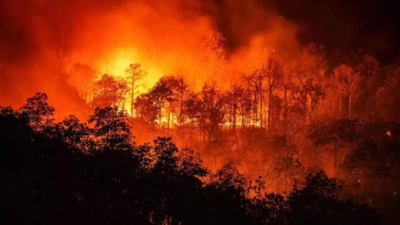The catastrophic wildfire currently sweeping through Los Angeles has already left at least 11 people dead, destroyed thousands of homes, and decimated large areas of land. What began as a relatively contained fire quickly spiraled into a full-scale disaster due to a dangerous combination of high winds, dry conditions, and insufficient resources.
The fire first broke out on January 7 in the Altadena area, quickly escalating as gusts of winds reached speeds over 80 mph. The ferocious Santa Ana winds carried the flames from the mountains into densely populated urban areas like Malibu and Pacific Palisades.
By January 8, the fire spread so quickly that it overwhelmed local firefighting efforts, forcing thousands of residents to evacuate. Despite efforts to control the flames, critical infrastructure like fire hydrants were found to be ineffective in several areas, with reports by NBC News, indicating that some hydrants had run dry, leaving firefighters without essential resources when the fires reached the city’s urban core.
Why the fire was so catastrophic
Several factors contributed to the catastrophic scale of this wildfire. One of the primary reasons for the fire’s rapid spread was the intense, gusting winds, which carried the flames through narrow canyons, fanning them and creating a firestorm that was nearly impossible to control.
One of the biggest factors is that you have prolonged dry spells and low humidity. And then you have the Santa Ana winds coming from the desert—very, very high winds, as much as 100 miles per hour. Once you get a spark, those things just blow.
Jeffrey Schlegelmilch, director of the National Center for Disaster to the Columbia Climate School
According to fire experts, the Santa Ana winds are notoriously unpredictable and dangerous, often making wildfires more difficult to manage, NBC reported. While these winds have been a regular feature in the region’s fire seasons, their intensity in January 2025 was exacerbated by extreme weather patterns driven by climate change, making the situation even more perilous.
Additionally, the region had been in a prolonged dry spell following a brief period of rain in 2023, which left the vegetation parched and ideal for fueling wildfires.
The dry conditions created a perfect storm for the fire to spread rapidly across both urban and rural areas the Columbia Climate Review said. As Jon Keeley, a research ecologist, noted, the drought-like conditions left behind large amounts of dry vegetation that acted as fuel for the blaze. Without significant rainfall to replenish the vegetation, the fire’s progression was unstoppable once the winds took hold.
Urban sprawl, particularly in areas at the wildland-urban interface (WUI), also played a significant role in the severity of the disaster. Many of the affected areas, including affluent neighbourhoods, have experienced rapid growth in recent years.
As noted by the Columbia Climate Review, areas like Malibu, which were once remote and sparsely populated, have seen significant development, increasing the vulnerability of these communities to wildfires. This urbanisation, combined with inadequate fire-resilient infrastructure, left many homes exposed to the flames with limited escape routes and firefighting resources.
As fire departments struggled to keep up with the overwhelming scale of the fire, reports indicated that many affected residents were not provided with sufficient evacuation instructions. In some cases, confusion over emergency alerts led to false evacuations, further delaying response efforts, the NBC report said.
Local authorities, including Governor Gavin Newsom, have vowed to conduct a full investigation into the utility failures, including the lack of water at critical moments during the fire.




